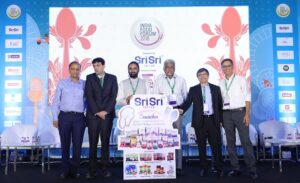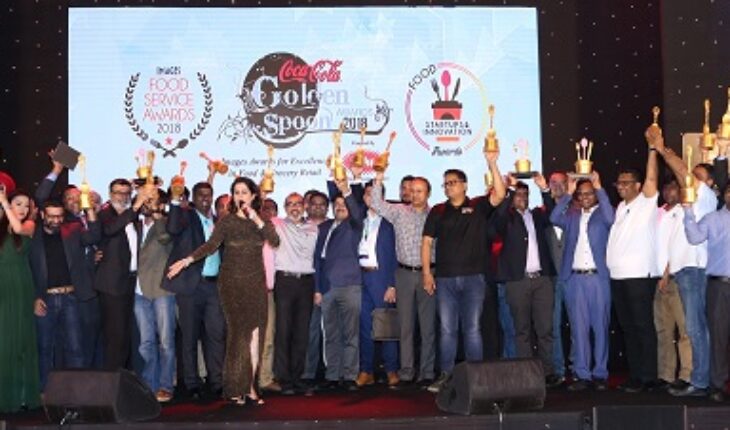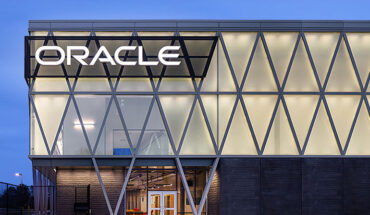Food retailers need to highlight Indian cuisine globally in order to promote quality and scaling-up while also meeting the needs of the country’s retail market, according to retail industry stalwarts at the 11th Indian Food Forum in Mumbai recently.
“We must Make In India for the world — while also catering to India’s needs –with a driven quality and scale. If Pasta can be sold across the world, we can also sell ‘khakra’ globally,” Piruz Khambatta, CMD, Rasna, said while noting that 75% of India still wanted pickles or soft-drinks at Rs. 2 which, despite a huge opportunity, does not grow beyond a nascent stage.
With food integrating into lifestyle changes and getting more personalized, this underlined the need to create greater awareness about what type of – and when – food can be consumed, according to Arvind Varchaswi, Managing Director, Sri Sri Tattva.
Echoing this view, Jamshed Daboo, MD, Trent Hypermarkets, noted that India’s food retail sector is currently promoting product brand power without understanding the palate’s needs. “With food access to consumers — which was dependent on distribution — set to change, the situation today is not a game of scale anymore, but of skill. New innovation in supply chain management will help in product cycle end-to-end and give consumer something different than they were otherwise getting in their catchment area,” he said.
Earlier, in his keynote address, Krish Iyer, Chairman, India Food Forum 2018 and President & CEO, Walmart India, pointed out that India is witnessing a transformation – such as FDI reforms in food retail, or implementation of path-breaking reforms like GST—that all made the country a unique and priority investment destination.
Highlighting India’s journey towards enabling higher rural income, sprucing up farm infrastructure, and creating world-class last-mile distribution and retail infrastructure in the country, Iyer said, “Today’s tech-savvy generation, growing internet and smartphone penetration is driving the evolution of the food segment. Their preference to engage with grocers and retailers on their own terms has brought about a tectonic shift in consumption patterns and made technology a necessary tool to offer the most relevant value propositions such as experience, convenience, price and choice.”
The India Food Forum 2018 also witnessed a tie-up between Sri Sri Tattva (health wellness FMCG company) and Big Basket for strengthening the former’s online presence and multiple products – launched during this event — across the latter’s robust delivery network. Tej Katpitia, CEO, Sri Sri Tattva, said that this partnership would provide modern-day consumers across India with greater access and awareness about health and lifestyle needs including healthier alternatives like Organic Brown Sugar, Rock Salt, Organic Cold Pressed Virgin Coconut Oil and Ghee made from cow’s milk.
Hari Menon, CEO, Big Basket, described the partnership as ‘win-win’ for both parties, as – with people now getting more and more health oriented — it focused on catering to these health-conscious consumers with high quality products.
Sri Sri Tattva also launched a comprehensive range of cooking products including pure Cow’s ghee, Organic Virgin cold pressed Coconut Oil, Whole Wheat Atta, Basmati Rice, 100% Natural Honey, Brown Sugar, Rock Salt, a range of Masalas and Spices along with a range of staples and pickles at the India Food Forum 2018.
Highlighting the need for positively inspiring the modern world towards healthy and happy living through the company’s consistent innovation in food and Ayurveda, Arvind Varchaswi, Managing Director, Sri Sri Tattva, said the company would provide these products through all traditional and modern channels across the market as well as online through its website, mobile App and leading e-commerce players, besides also Sri Sri Tattva Marts and Home & Health franchise stores opening shortly across the country.
The event also witnessed the +Coca Cola Golden Spoon+ Awards being presented to outstanding achievers among India’s leading food service chains and food & grocery retailers.
The three-day India Food Forum event held in Mumbai recently highlighted alliance avenues with foreign partners to expand the food market in India. Trade commissioners of several countries identified avenues for partnerships in food, beverages and food service industry and how Embassies and Trade commissions could play a more pro-active role to facilitate such alliance. They noted that India, as an emerging major market, offered huge opportunities for global manufacturers, producers and providers of products and services to sell here or partner with Indian companies to serve this market.
Acceptance of multinational culture, a growing taste for global foods, increasing inflow of foreign nationals, willingness to experiment new cuisines and moreover avenues to market new products further add to the opportunity. Embassies and Trade Commissioners of foreign countries in India are well placed to capture these opportunities for business organization in their respective countries.
The global participating Trade Commissioners and Embassy officials included countries like USA, Ecuador, UK, Colombia, France, Canada and Spain.
Meanwhile, India’s food service sector continues to rise as the number of restaurant diners grows, while growth of household incomes– fueled by rises of dual-income households– is making family vacations and dining out more accessible, according to a report by Global Agricultural Information Network (GAIN).
Fast expansion of varied format foodservice outlets are gaining popularity across major and emerging market cities. Franchising remains the most popular growth model. Despite the trends, adoption of high-value imported ingredients, foods and beverages remains a challenge.
The World Bank’s “Doing Business 2017 report stated that, despite efforts to improve business and trade, the Indian Government has not lowered tariffs or noticeably improved access for imported food and agricultural products over the past several years.
India’s Hotel, Restaurant and Institutional (HRI) service sector is benefiting from India’s relatively strong economic growth, foreign investment, rise in dual income earning households, rising incomes, high aspirational levels, a young population, increasing tourism, and changing consumer consumption patterns. While opportunities for foreign food exporters to supply into the HRI sector are improving, the market for imported food products remains relatively small due to high tariffs, ongoing import restrictions and strong competition from the domestic industry.
India has a vast hotel sector but a small percentage of three stars and above hotels. The overwhelming majority of hotels are small, traditional outlets that provide inexpensive accommodations for travelers and source all of their food locally. The Ministry of Tourism noted that there are over 1903 hotels and resorts in India that are “organized” or modern. With foreign and domestic travel increasing in recent years, the number of modern hotels that carry atleast small amounts of imported foods on their menus is on the rise.
Where restaurants are concerned, Indian consumers appear to be dining out more frequently and, with an estimated 100,000 modern, organized restaurants in India, there is plenty room for industry growth, according to the National Restaurant Association of India (NRAI), the total food service market is valued at U.S. $48.3 billion (Rs 309,110 crores) and is expected to grow to U.S, 77.8 billion (Rs 498,130 crores) by 2021.
The factors driving HRI Food service growth include: HRI chefs introducing new cuisines and culinary practices; “Indianizing” foods to customer preferences; international hotel chains penetrating the Indian market with new cuisine and dining experiences; growing trend for convenience in food courts and shopping destinations; dine-in locations expanding inside hypermarkets and supermarkets, strong growth in casual dining and fast food sectors from both domestic and foreign chains; increased competition in keeping costs in check while ensuring delivery of value for money; slowdown in global economy causing increased domestic travelers opting for leisure destinations within India.
 The Indian market for imported foods has grown slowly, though there is an increasing number of professional, brand-oriented importers that actively seek out customers in modern restaurant and hotel sectors. However, these sectors seek foods or ingredients that are not readily available in India. Among four and five-star hotels, imported products include wine and other alcoholic beverages, dairy products, meat, seafood, fruits, frozen French fries, sauces, seasonings and condiments, drink mixes, and ingredients for foreign cuisines such as Italian, Thai, Japanese, Chinese, Peruvian, Mexican and Spanish.
The Indian market for imported foods has grown slowly, though there is an increasing number of professional, brand-oriented importers that actively seek out customers in modern restaurant and hotel sectors. However, these sectors seek foods or ingredients that are not readily available in India. Among four and five-star hotels, imported products include wine and other alcoholic beverages, dairy products, meat, seafood, fruits, frozen French fries, sauces, seasonings and condiments, drink mixes, and ingredients for foreign cuisines such as Italian, Thai, Japanese, Chinese, Peruvian, Mexican and Spanish.
Regional trading hubs like Dubai and Singapore remain important suppliers to the Indian market but the import process continues to be complex and relatively costly. So hotels and restaurants source their products from local importers and distributors having expertise in clearing, storing and transporting products. With the rise of chain restaurants, modern companies specializing in food handling have emerged also.
Meanwhile, with the rise in tourism (destination weddings, eco-tourism etc) and business travel, several international brands are exploring the possibility of expanding further in India’s Tier 2 and Tier 3 cities. The Indian Government is providing incentives to stimulate construction of new hotels to match sector growth. These include: five-year tax holiday for 2, 3 and 4-star category hotels located in UNESCO-declared World Heritage sites (except Mumbai and Delhi), 100 % FDI control credit at reduced interest rates.
The Indian wine industry estimates that half of all wine imports enter India through the hotel sector’s duty-free exemption. Over the past five years, India has been touted as a wine market with tremendous potential that is attracting interest of global wine suppliers and witnessing many wine exporters competing to supply the relatively small hotel market.
Cafes, bars and pubs outlets are growing as consumer demand increases – driven by factors like: favourable demographics, rising income levels, development of mid-sized cities and the advent of international chains. A growing willingness – especially among the youth – to consume food and drink outside the home and increasingly disposable incomes are helping to fuel further growth. Cafes are considered perfect places to socialize and hangout. Hence sales of this category are driven by the younger and working generation. Young people also prefer to drink on-site and socialize rather than taken products away.
Bars and pubs growth is associated with rising disposable incomes, , greater population of younger people reaching legal drinking age, growth of consumers in smaller towns, and widening exposure to pub culture. Bars and pubs make a major portion of their revenue from drinks, but most serve meals and snacks. Brew pubs featuring craft products are a new concept that is appearing across several big cities and slowly gaining popularity. Franchising continues to be one of the most popular ways of expanding among café/bars players.
India’s domestic industry is the primary competitor for U.S. food ingredient providers with its low prices and steadily improving quality, besides its diverse climatic conditions producing variety of foods and ingredients at prices below those of most imported products. High import duties and restrictions on a number of imported raw materials pose additional challenges for direct US, imports to the market.






